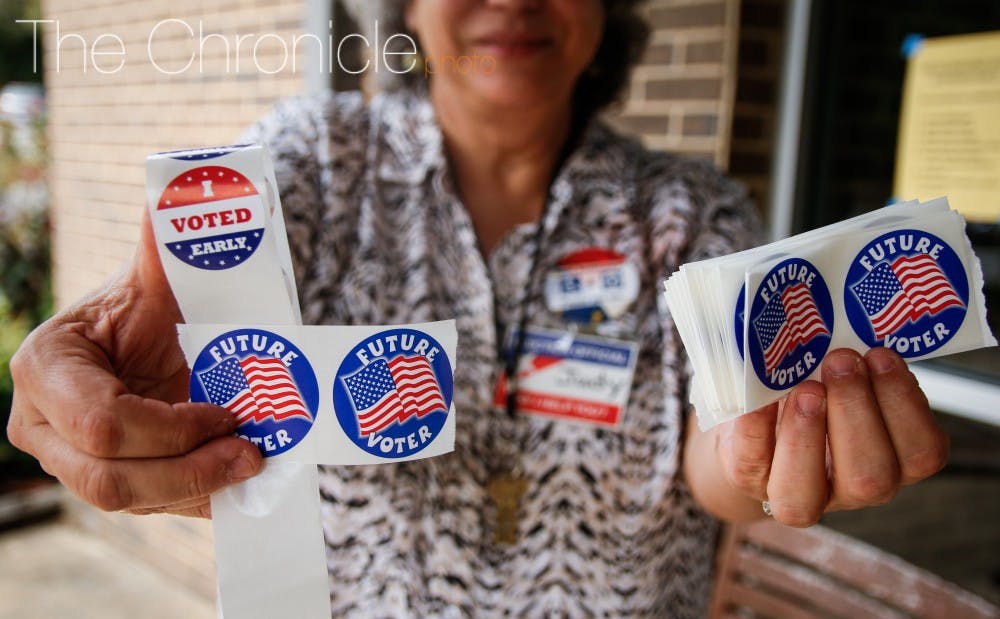The Department of Homeland Security is investigating the equipment—provided by a company allegedly targeted by Russian hackers—used in Durham County during the 2016 election.
On Election Day in 2016, certain voting machines malfunctioned by incorrectly telling voters they had already cast their ballot, leading affected polling stations to switch to paper poll books, according to the Washington Post. The equipment also asked some people for photo identification, which was not legally required at the time. This snafu created lengthy delays and led some precincts to extend voting hours.
Durham County then tapped the cybersecurity company Protus3 to conduct an investigation into the situation in 2016. The firm concluded that poll workers caused the error for several voters, but it was inconclusive about the other issues and offered ideas for further investigation, leading North Carolina to deem the findings inconclusive.
In 2017, a leaked National Security Agency report suggested that a Russian hacking campaign targeted VR Systems—the election software company that provided Durham’s machines—and sent malicious emails to about 120 local government offices.
Furthermore, Special Counsel Robert Mueller’s redacted report revealed that the Russian military intelligence agency installed malware on the network of an unidentified "voting technology company."
Ben Martin, chief operating officer of VR Systems, has acknowledged that the Mueller report may have been referring to his company but denied that it was hacked by Russians meddling in the election.
Derek Bowens, director of elections for Durham County since 2017, explained that the poll book malfunction most likely stemmed from internal human error. He argued that all hacking claims have been nothing but speculation.
“I know,” Bowens wrote in an email to The Chronicle, “per the investigation that Durham County authorized following the events of the 2016 General election, that there were internal preparation issues related to the training of precinct officials and the laptops used for the election, which highly correlate with the issues that were dealt with on Election Day. We know that and we have not received information to the contrary."
Mac McCorkle, professor of the practice in the Sanford School of Public Policy, agreed that Russian interference in Durham during 2016 is unlikely, but advised "not [to] discount any possibilities." He noted that North Carolina, specifically Durham, is not the ideal place for Russians to hack due to the higher use of paper ballots.
"In the case of Durham, they had paper ballots ready to go and were able to record all of those votes provisionally," he said. "I'm not sure that in some states, they would've been able to be that quick to go to plan B, so to speak."
He added that a better strategy for Russian interference would have been to change votes rather than display that people had voted when they hadn't. However, he didn’t rule out potential hacking.
"It may be that it's still them just exploring and doing whatever they possibly could to in some way disrupt the election, because it certainly was disruptive for a while," said McCorkle, who claimed the incident could have been a Russian “test run.”
After the inconclusive third-party investigation results, the State Board of Elections, decidedly lacking "the necessary technical expertise to forensically analyze the computers," requested federal assistance.
Josh Lawson, former general counsel for North Carolina’s Board of Elections, said that the board had filed several investigation requests to the DHS in the past two years.
Despite the delayed federal response, Bowen wrote that he is hopeful that the investigation will “end all speculation on what happened and bring finality to this lingering question.” He also noted that Durham is taking steps to prevent a repeat of the 2016 confusion.
Aside from Durham’s transition away from VR Systems to North Carolina’s software in 2017, the elections board has been working on updating poll book procedures and training for 2020.
Additionally, Bowen wrote that they have developed a precinct official training website and now require all officials to attend an electronic poll book training session. Precinct officials are also provided with a full training manual, checklists and supplemental training materials to precinct officials.
Another way to protect elections is to build in a lot of redundancy, McCorkle explained, or even grow less reliant on technology when paper ballots could be used instead.
Although McCorkle said he is glad that DHS is finally looking into the issue, he wished they had done so sooner.
"It's late in the day to be examining this because it's now going to be hard to take the best steps in response in such a short period of time [before 2020]," he said. “The tragedy is that the political polarization in the country is so great that regardless of all the vertical back and forth, there should be a high premium put on protecting our elections.”
Editor's Note: This article has been updated to clarify that Bowens began as director of elections for Durham County in 2017.
Get The Chronicle straight to your inbox
Signup for our weekly newsletter. Cancel at any time.

Mona Tong is a Trinity senior and director of diversity, equity and inclusion analytics for The Chronicle's 117th volume. She was previously news editor for Volume 116.

